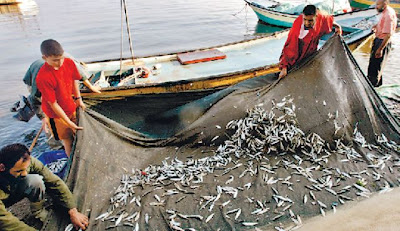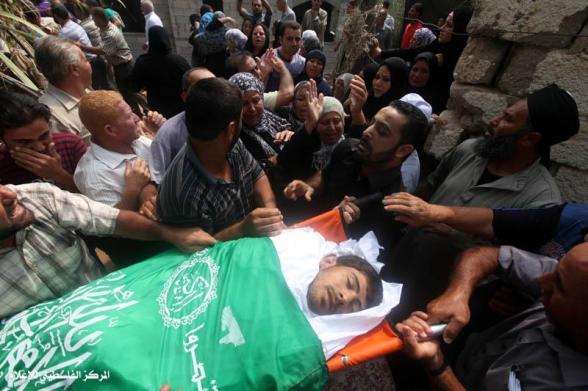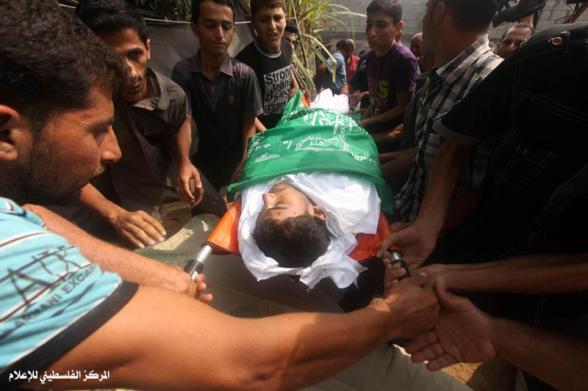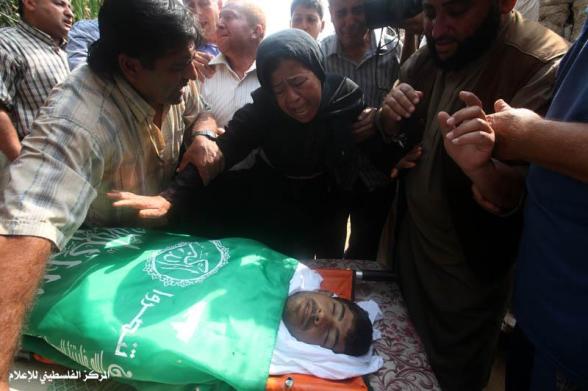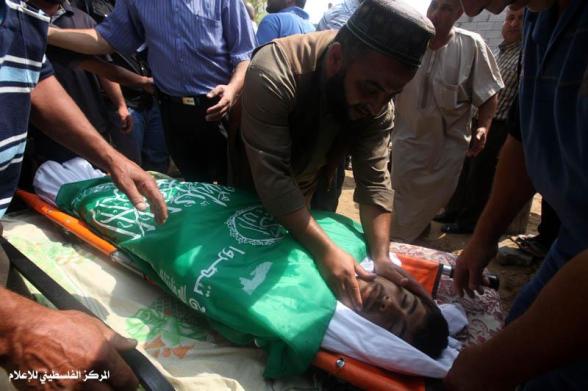Israel allows fishermen to sail only to a distance of three nautical miles off the Gaza shore, instead of 20, as specified in the Oslo Accords. But the fish have the chutzpah not to take this restriction into account.
Once again there was
saber-rattling, and the inbox was filled with boasts by armed
organizations about their part in last week's escalation. And this is an
opening that is meant to lead at least some of the readers to Fahmi Abu
Riash.
"The Mujahideen Brigades, the military arm of the Mujahideen movement,"
reported that they had launched two 107-mm. rockets, "as part of the
natural response to the enemy's crimes against our people and its
ongoing belligerence against the Gaza Strip."
The National Resistance Brigades of the Democratic Front also boast of
two 107-mm. missiles and even call on all the military arms "to
establish a joint [operations] room to discuss the nature of the
response to the crimes of the occupation."
The spokesman for the Popular Resistance Committees said, according to
one of the emails, that the blessed shelling by the committees indicates
"the willingness of its heroic fighters to repulse the Zionist enemy
and to respond in a painful manner."
And who else is responding? The Israel Defense Forces, of course. "The
IDF spokesman says that forces from the armored corps and the Air Force
attacked terror targets in the Gaza Strip this morning ... The attacks
are a response to the steep-trajectory firing at the territory of the
State of Israel."
The firing itself was a response to several short invasions into areas
of the Strip, the sweeping away of agricultural land and the killing of
armed Palestinians. And some of the attacks came in response to the
detonating of an explosive device that was aimed at another group of
armed men - this time Israeli soldiers. Even if the IDF spokesman failed
to disclose their precise location, the Palestinian reports indicate
that the soldiers were inside the area of the Strip. In short, every
attack is a response to a previous response/attack by the other side,
and vice versa, and so on and so forth.
A summary of last week: Seven armed Palestinians dead, eight
Palestinians wounded; a soldier and three civilians (actually migrant
workers ) wounded.
OCHA (the UN Office for the Coordination of Humanitarian Activities )
reports a ninth Palestinian casualty: a resident of Beit Hanoun in the
northern Gaza Strip who was hit by a Palestinian rocket. These are
always the hidden victims, who are underreported.
And not only they. Fahmi Abu Riash is also erased - as though he never
existed - from the balance of attack and response and from Israeli
reports that have fallen hostage to the IDF.
And this was the reply of the omniscient narrator - the IDF spokesman
in this case - to my question about the circumstances of the killing of
Abu Riash on September 28: "In the event under discussion a number of
suspicious people were identified near the security fence in the
northern Gaza Strip. It should be noted that approaching the fence is
often exploited for planting explosive devices, gathering intelligence
information and attempts to attack Israeli civilians and IDF soldiers.
In light of all the circumstances of the incident, an IDF force began to
implement the procedure for detaining a suspicious person and called on
them to stop. When they didn't do so they were shot in the legs, which
led to an injury."
Abu Riash of Beit Lahia was a fisherman, 22 years old, married to
Fatma, father of 16-month-old Saleh. From the standard response of the
IDF spokesman (in the style of "copy and paste" ) we can conclude that
the "suspicious figures" were walking on foot to the border fence. Maybe
they were also hiding suspicious objects in their bags. But that is not
the case. When he was shot, Abu Riash was standing in the water, about
five meters from the beach. That Friday morning he went out with his
brother and cousin to fish for mullet, which swim in schools near the
beach. That's why "we didn't go out in boats," explained the cousin,
Yousef Ziad, adding a few details to the "overall circumstances." "We
entered the water almost naked, we cast the nets. We were a few meters
from the beach. And it's true, not far from the border, a few dozen
meters from the fence that continues into the water. We started out
further away (from the fence) and advanced with the movement of the
fish."
And additional details omitted from the "overall circumstances": Israel
allows the Gaza fisherman to sail only to a distance of three nautical
miles (instead of 20, as specified in the Oslo Accords). The fish have
the chutzpah not to take into account this restriction, for the most
part. That's why the proximity of the mullet to the beach is a welcome
opportunity for earning money. Every week, in a routine that the
omniscient narrator ignores in his routine reports, the soldiers of the
Israeli Navy fire on Palestinian fishermen (still within the three-mile
limit) and sometimes detain them and transfer them for a minor
interrogation at the Shin Bet security service's offices in Ashdod (only
last week four were detained), in an attempt to gather intelligence
information.
Due to the shooting, the routine of instilling fear and the restriction
of maritime space, the fishing industry has shrunk greatly and many
have joined the army of the unemployed (28.4 percent in the Strip,
according to the World Bank ) and to families suffering from food
uncertainty (52 percent according to the United Nations ).
The omniscient narrator did not reply to Haaretz's question regarding
the location of the soldiers who killed Abu Riash. But neither did he
deny the evidence that the firing came from inside the area of the
Strip. Ziad said that the soldiers who fired spread out on a hill south
of the border, a short distance from the fishermen, with their faces
painted black and armed with long rifles and communications devices.
When armed and unarmed Palestinians cross this fence they are called
infiltrators. Their fate - being killed or detained - is considered
legitimate and not worthy of monitoring or questioning.
There were eight or nine soldiers there, recalls Ziad. He and his
brother got out of the water when they saw them. Did they warn them
before shooting, I asked. "What they said was unclear. They shouted
something, then immediately fired," said Yousef Ziad in a phone
conversation. "The first bullet hit the water or the sand, but there was
a very strong explosion and I thought it was a grenade."
Fahmi shouted, wounded. His brother Yousef Abu Riash started to carry
him out of the water while shouting to the others to bring help quickly.
And then the soldiers fired again, and Yousef was wounded in his hands
and feet. He managed to drag Fahmi a few more meters, and then fainted.
Yousef suffers from partial paralysis and the shrapnel still has not
been removed from his body, as reported by the Palestinian Center for
Human Rights. His brother Fahmi died on the operating table: The bullets
had destroyed his internal organs.
In the Strip they call such bullets "dum-dum" bullets (whose use is
prohibited ). But military sources reassured Haaretz: "The firing was
carried out in accordance with the permanent orders for opening fire in
the sector, and there was no use of 'dum dum' bullets in this incident."
And an anonymous soldier from an elite commando group, who stands above
any criticism and question, can wave his rifle barrel and boast of
another hit.
